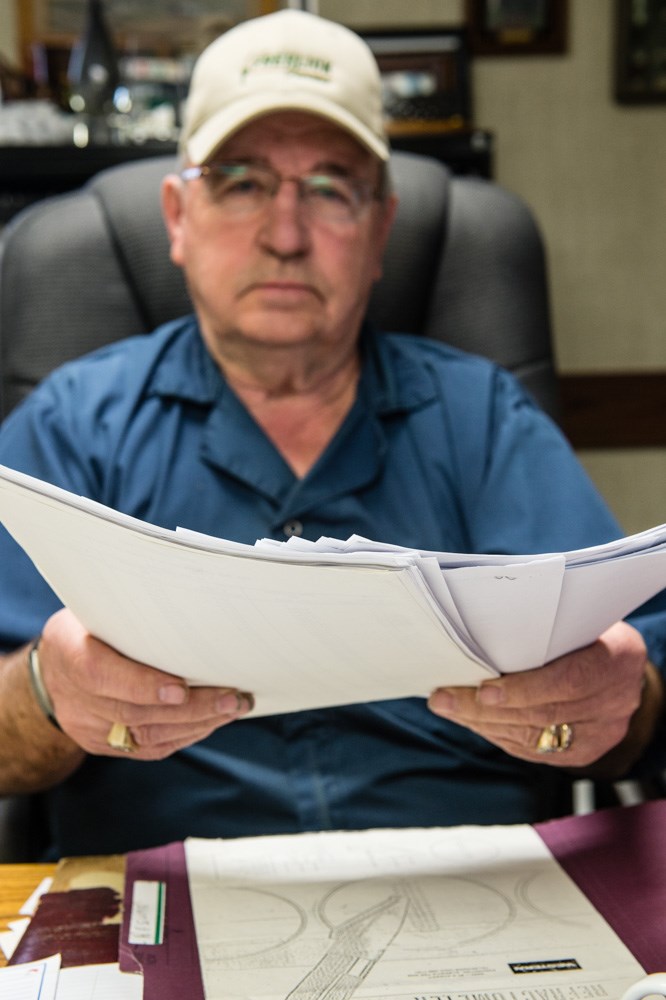Estevan – The file he pulls out of the filing cabinet is thick- probably an inch or so, and full of hopes - hopes of full-time work, hopes of a steady paycheck. The file, you see, is full of resumés, and it’s been quite a while since Ray Frehlick has had a file this thick.
In our series of stories on doing a job search, this turns out to be one more stop where there are no jobs up for grabs.
Frehlick, 79, is the owner of Prairie Mud Service. He once had interests in numerous other enterprises, including Prairie Petro-Chem and Plains Environmental, but in recent years he’s been slowing down, if you can call it that, and selling some of them off. His hat still says “Frehlick Farms,” which has 14,000 acres.
There’s probably 20 resumés, maybe more, in that stack. But it’s not likely many will be hired any time soon. The companies impacted the most by the current slowdown in the oil industry are those closest to the drill bit. Since Prairie Mud Service produces the drilling fluids that literally touch the drill bit, that’s about as close as you can get.
Since the beginning of the year, drilling activity in Saskatchewan has dropped to less than half the pace it has been during the same time over the last several years. The busiest week of drilling of the whole year is usually the last week in February, but this year instead of seeing 100 to 110 rigs drilling, there were around 45.
“We’ve got too many people,” Frehlick said. They’ve laid of a few people in Alberta.
“We’ve got some close to retirement that plan on retiring earlier than anticipated.”
The may come back on a day-rate basis as needed, he explained.
Holding onto staff is important to Frehlick, who has seen this many times before. “In these downturns, we never laid young people off, because that’s the future of companies.”
This downturn might be a little longer than usual, he noted, since “it’s not brought on by a recession, but surplus barrels of oil.”
The period from in 1983 to 1988 was probably worse, he noted, as bank interest rates were running in the 22 to 23 per cent range then. “Anybody carrying debt, it was tough on them,” he said.
One of the practices that changed things was the adoption of horizontal drilling, according to Frehlick. He pointed to a picture on the wall of Spartan Drilling working on a horizontal well near Midale, one of the first in the province.
When presented with a resumé with excavator operator qualifications, Frehlick suggested the recently announced highway bypass projects near Regina. “There’s going to be a lot of infrastructure work this year, a massive amount of infrastructure.”
He noted there’s also an expected rail line for the K+S Potash mine near Moose Jaw. But what about work around Estevan?
“No, I don’t think we’ll see a lot of work in this region,” he said.
As for that stack of resumés, he said, “There’s electricians, service rig operators, truck drivers…”
“There’ not going to stay here if the price of oil goes back up. You can make $32 an hour on a service rig, plus overtime. We pay above the industry average, but not service rig and drilling rig rates.”
He noted in those industries while the pay is high, you are only paid when you work, and drilling activity is down 50 to 60 per cent.
“It impacts our sales if there’s no drilling.”
He pulled out a binder with their daily reports. On Feb. 13 there were 19 rigs listed. Usually around that time of year it might be 25 to 30.
“There are areas where breakup will last longer due to the economy, not runoff,” he said.
Some companies are talking about work resuming in June, hopeful for a price recovery, according to Frehlick. “I have difficulty believing in a price recovery in the next two to three months due to the glut of oil. We are an exporter. We don’t have the refining capacity to use what we produce.”
When spring seeding kicks in across the continent, that will increase the demand equation, as will wells shut in for road bans and economics.
Frehlick noted that Crescent Point can drill cheaper now because of vendors cutting prices, and they are taking advantage of those lower prices. But he wonders what will happen when the road bans come off.
So did Prairie Mud cut prices?
“Oh sure, everybody did,” Frehlick replied.
“I have mixed feelings about it. We’re selling a commodity. We have to buy it, service it and supervise it. It certainly hurts your bottom line. It’s not like having a truck with a set of tongs.”
A lot of their product is made in the United States, and with the decline of the Canadian dollar compared to the American dollar, it’s made bringing that product in more expensive.
Prairie Mud has 65 people on staff. They’re not hiring right now. Asked if he had any opportunities for someone with my qualifications, the answer was “No.”
Anyone who is hiring can be more selective, he added.
“When is it going to turn around? There’s a lot of experts, and no one’s got answers,” Frehlick said.
In 2009, oil dropped to the $38 range, but he noted it wasn’t long before it came back to $75-$80.
“We didn’t have the number of Bakken wells drilled we have today,” he pointed out. Bakken wells are known to have steep decline rates, and thus companies with high Bakken concentrations need to keep drilling to maintain production.
Speaking more broadly, he noted companies that are undercapitalized are going to have a tough go of it.
“Being in business is like being born. You learn to crawl. You learn to walk, and then you run. Don’t miss any steps in between,” Frehlick concluded.




